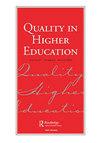The quality of higher education in Kyrgyzstan through the eyes of students
IF 1.5
Q3 EDUCATION & EDUCATIONAL RESEARCH
引用次数: 8
Abstract
ABSTRACT In this study, the perceived quality of higher education in the Kyrgyz Republic was analysed from the students’ perspective. The factors affecting the university choice as well as factors defining the perceived quality of education were investigated using a quantitative approach. The results of the study revealed that students perceive the quality of higher education in the country as rather satisfactory. The difference was observed among responses collected from different universities. Besides, the satisfaction of students from universities located in different regions differs: surprisingly, students from remote regions perceive education provided by their universities as a higher quality education than those from central universities. In addition, it was observed that factors such as university infrastructure, financial or other types of support, qualification of teachers and attitude of staff towards students also defined their perception of education quality.吉尔吉斯斯坦高等教育质量通过学生的眼睛
摘要本研究从学生的角度分析了吉尔吉斯共和国高等教育的感知质量。采用定量方法对影响大学生选择大学的因素以及影响大学生感知教育质量的因素进行了研究。研究结果显示,学生们对该国高等教育的质量感到相当满意。从不同大学收集的回答中观察到差异。此外,来自不同地区大学的学生的满意度也不同:令人惊讶的是,来自偏远地区的学生认为他们的大学提供的教育比来自中部大学的学生提供的教育质量更高。此外,据观察,大学基础设施、财政或其他类型的支持、教师资格和工作人员对学生的态度等因素也决定了他们对教育质量的看法。
本文章由计算机程序翻译,如有差异,请以英文原文为准。
求助全文
约1分钟内获得全文
求助全文
来源期刊

Quality in Higher Education
EDUCATION & EDUCATIONAL RESEARCH-
CiteScore
3.30
自引率
14.30%
发文量
32
期刊介绍:
Quality in Higher Education is aimed at those interested in the theory, practice and policies relating to the control, management and improvement of quality in higher education. The journal is receptive to critical, phenomenological as well as positivistic studies. The journal would like to publish more studies that use hermeneutic, semiotic, ethnographic or dialectical research as well as the more traditional studies based on quantitative surveys and in-depth interviews and focus groups. Papers that have empirical research content are particularly welcome. The editor especially wishes to encourage papers on: reported research results, especially where these assess the impact of quality assurance systems, procedures and methodologies; theoretical analyses of quality and quality initiatives in higher education; comparative evaluation and international aspects of practice and policy with a view to identifying transportable methods, systems and good practice; quality assurance and standards monitoring of transnational higher education; the nature and impact and student feedback; improvements in learning and teaching that impact on quality and standards; links between quality assurance and employability; evaluations of the impact of quality procedures at national level, backed up by research evidence.
 求助内容:
求助内容: 应助结果提醒方式:
应助结果提醒方式:


